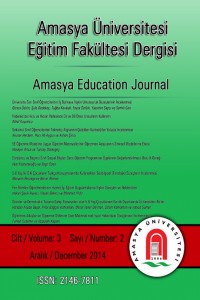Öz
Bu çalışmada, matematik öğretmen adaylarının öğrenme stillerine göre matematiksel ispat yapmaya yönelik görüşlerindeki farklılıklar incelenmiştir. Çalışmada farklı öğrenme stiline sahip öğretmen adaylarının ispat yapmaya yönelik görüşlerinin belirlenmesinde nitel araştırma yaklaşımından yararlanılmıştır. Çalışma araştırmacılar tarafından belirlenen bir üniversitenin ilköğretim matematik öğretmenliği bölümünün dördüncü sınıfında öğrenim görmekte olan sekiz öğretmen adayı ile gerçekleştirilmiştir. Araştırma kapsamında, çalışma grubuna öğretmen adaylarının öğrenme stillerini belirlemek amacıyla Kolb (2005) tarafından geliştirilen “Öğrenme Stili Ölçeği” uygulanmıştır. Ayrıca öğretmen adaylarının matematiksel ispat hakkındaki görüşlerini ortaya koyma amacıyla yarı yapılandırılmış Matematiksel İspata Yönelik Görüşme Formu (MİYGF) uygulanmıştır. Ulaşılan araştırma bulgularına göre, çalışmaya katılan öğretmen adaylarının sahip olduğu öğrenme stiline göre matematiksel ispat yapmaya yönelik farklı görüşlerinin bulunduğu anlaşılmıştır..
Anahtar Kelimeler
Kaynakça
- Almeida, D. (2003). Engendering proof attitudes: can the genesis of mathematical knowledge teach us anything? International Journal of Mathematical Education in Science and Technology, 34(4), 479–488.
- Almeida, D.A. (2000). Survey of mathematics undergraduates’ interaction with proof: Some implications for mathematics education. International Journal of Mathematical Education in Science and Technology, 31(6), 869-890.
- Anapa, P. & Şamkar, H. (2010). Investigation of under graduate students’ perceptions of mathematical proof. Procedia Social and Behavioral Sciences, 2, 2700–2706.
- Aşkar, P. ve Akkoyunlu, B. (1993) Kolb öğrenme stili envanteri. Eğitim ve Bilim, 87, 37-47.
- Baker, D. & Campbell, C. (2004). Fostering the development of mathematical thinking: Observations from a proofs course. Primus, 14(4), 345–353.
- Baki, A. (2008). Kuramdan uygulamaya matematik eğitimi. Harf Eğitim Yayıncılığı, 4. Baskı, Ankara.
- Boydak, A. (2001). Öğrenme stilleri. İstanbul: BeyazYayınları.
- Corbin, J.M., ve Strauss, A. C. (2007). Basics of qualitativeresearch: Techniques and procedures for developing grounded theory. Thousand Oaks, CA: Sage Publication.
- de Villiers, M. (1990). The role and function of proof with sketchpad. Pythagoras, 24. 17-24.
- Doruk, M. ve Kaplan, A. (2013). İlköğretim matematik öğretmeni adaylarının matematiksel ispata yönelik görüşleri. Eğitim ve Öğretim Araştırmaları Dergisi, 2(1), 241-252.
- Dunn, R. & K, Dunn (1993). Teaching secondary students through their individual learning styles. Boston: Allyn & Bacon.
- Edwards, B.S. & Ward, M.B. (2004). Suprises from mathematics education research: Students (mis)use of mathematical definitions. The American Mathematical Monthly, 111, 411–424.
- Ekici, G (2003) Öğrenme stiline dayalı öğretim ve biyoloji dersi öğretimine yönelik ders planı örnekleri. Ankara: Gazi Kitabevi.
- Ekiz, D. (2003). Eğitim Araştırma Yöntem ve Metodlarına Giriş. Anı Yayıncılık, Ankara
- Felder, R. M. & Silverman, L. K. (1988). Learning and teaching styles in engineering education. Engineering Education, 78(7), 674–681.
- Felder, R.M. (1996). Matters of style. ASEE Prism, 6(4), 18-23.
- Gencel Evin İ. (2007). Kolb’un deneyimsel öğrenme kuramına dayalı Öğrenme Stilleri Envanteri-III’ü Türkçeye uyarlama çalişması. Dokuz Eylül Üniversitesi Sosyal Bilimler Enstitüsü Dergisi, 9(2), 120-139.
- Gibson, D. (1998). Students’ use of diagrams to develop proofs in an introductory analysis course. Students’ proof schemes. In E. Dubinsky, A. Schoenfeld, & J.Kaput (Eds.), Research in Collegiate Mathematics Education, III, 284–307. AMS.
- Gregorc, A. F. (1984). Style as a symptom: A phenomenological perspective. Theory Into Practice. 23 (1), 51-56.
- Güler, G. ve Dikici, R. (2012). Orta öğretim matematik öğretmeni adaylarının matematiksel ispat hakkındaki görüşleri. Kastamonu Eğitim Dergisi, 20(2), 571-590.
- Jones, K. (2000). The student experience of mathematical proof at university level. International Journal of Mathematical Education in Science and Technology, 31(1), 53–60.
- Keefe, J.W. (1979).Learning style: An overview in student learning styles, diagnosing and prescribing program. Reston. VA: National Association of Secondary School Principlas, Connecticut, USA.
- Knuth, E.J. (2002). Secondary school mathematics teachers' conceptions of proof. Journal for Research in Mathematics Education, 33(5), 379-405.
- Kolb, D.A. (1984). Experiential learning: Experience as the source of learning and development. New Jersey: Prentice Hall.
- Kolb, D.A. (1999). The kolb learning style inventory. Hay Resources Direct.
- Kolb, D.A. (2005). Learning style inventory – version 3.1. Hay Group.
- Loo, R. (2004). Kolb’s learning styles and learning preferences: Is there a linkage. Educational Psychology, 24(1), 99-108.
- Marshall, C. (1990). The power of the learning styles philosophy. Educational Leadership, 48 (2), 62.
- Moore, R.C. (1994). Making the transition to formal proof. Educational Studies in Mathematics, 27, 249-266.
- Moralı, S., Uğurel, I., Türnüklü, E. ve Yeşildere, S. (2006). Matematik öğretmen adaylarının ispat yapmaya yönelik görüşleri. Kastamonu Eğitim Dergisi, 14, 1, 147-160
- More, A.J. (1987). Native Indian learning styles: A review for researchers and teachers. Journal of American Indian Education, 27 (1), 17-29.
- Raman, M.J. (2003). Key ideas: What are they and how can they help us understand how people view proof? Educational Studies in Mathematics, 52(3), 319-325.
- Stylianides, A. (2007). The notion of proof in the context of elementary school mathematics. Educational Studies in Mathematics, 65(1), 1-20.
- Taşcı, S. (2005). Hemşirelikte problem çözme süreci, Erciyes Üniversitesi Sağlık Bilimleri Dergisi Hemşirelik Özel Sayısı, 14, 73-78.
- Veznedaroğlu, R.L., ve Özgür, A.O. (2005). Öğrenme Stilleri: Tanımlamalar, modeler ve işlevleri, İlköğretim Online, 4(2), 1-16.
- Weber, K. (2006). Investigating and teaching the processes used to construct proofs. In F. Hitt, G. Harel & A. Selden (Eds), Research in Collegiate Mathematics Education, VI, 197- 232.
- Yıldırım, A. ve Şimşek, H. (2011). Sosyal bilimlerde nitel araştırma yöntemleri (8. Baskı). Ankara: Seçkin Yayıncılık.
- Özgen, K. ve Alkan, H. (2011). Matematik öğretmen adaylarının öğrenme stiline göre etkinliklere yönelik tercih ve görüşlerinin incelenmesi. Hacettepe Üniversitesi Eğitim Fakültesi Dergisi, 41, 325-338.
- An Analysis of Prospective Math Teachers’
- Thoughts about Mathematical Proof by Learning Styles†
- Furkan Özdemir*and Abdullah Kaplan
- Atatürk University, Turkey
Ayrıntılar
| Birincil Dil | Türkçe |
|---|---|
| Bölüm | Özgün Araştırma Makaleleri |
| Yazarlar | |
| Yayımlanma Tarihi | 29 Eylül 2014 |
| Yayımlandığı Sayı | Yıl 2014 Cilt: 3 Sayı: 2 |
Kaynak Göster
Amasya Üniversitesi Eğitim Fakültesi Dergisi (Amasya Education Journal)


